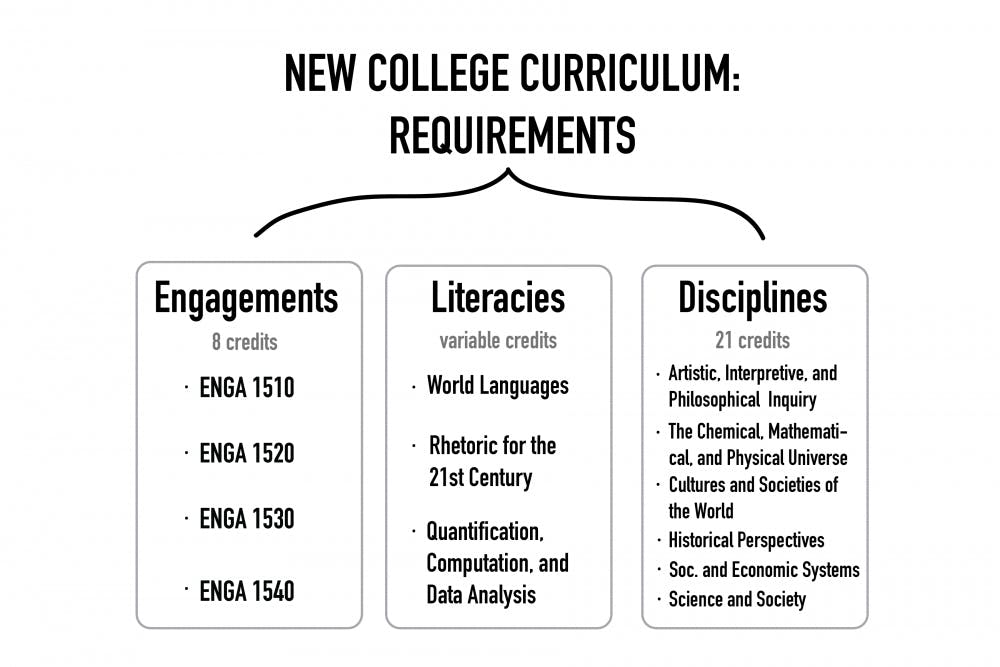At the beginning of the 2017-18 academic year, the College of Arts and Sciences introduced the New College Curriculum emphasizing creative and interdisciplinary learning as an alternative to the Traditional and Forums curricula. The curriculum consist of three areas of focus — the Engagements, the Literacies and the Disciplines — where students must earn a certain number of credits in each before graduating.
While most first-year students have opted to continue in the Traditional Curriculum, around 600 students have chosen to pilot the New College Curriculum.
Thomas Katsouleas, the University executive vice president and provost, said the number of students who were interested in the New Curriculum demonstrates its potential.
“We saw it as a good sign that we actually had to open up new sections to accommodate student interest,” Katsouleas said.
Grace Hale, an American Studies and history professor, currently teaches an Engagements course in the New Curriculum called “Race and Photography in America.”
“The participation level has been really high, and that's a way to gauge that [the students] are getting something out of it,” Hale said. “The fact that most people put their hand in the air at least once during a class, in fact, often all of them, suggests to me that they are getting something out of it, and that the course is fulfilling the idea of being engaging.”
First-year College student Paige Singer, who is currently enrolled in New Curriculum, said she enjoys her professors.
“They are accomplished in their own respective departments, but have opted to commit to a first year experience, where students are encouraged to consider big questions concerning their topics of expertise and how they pertain to ethics, to empiricism,” Singer said.
The idea for the New Curriculum began when faculty reflected upon the original mission of the University of teaching students not only skills and knowledge but to become civic leaders and have purposeful lives.
“When [Dean Ian Baucom] challenged the faculty to think about what is it we are trying to achieve with general education … the faculty thought deeply about that,” Katsouleas said. “It included notions of preparing citizen leaders for democracy and preparing students for vocation, meaning leading a life of meaning and purpose.”
The stated goals of preparing students for citizen leadership and vocation shaped the three parts of the New College Curriculum — literacies, disciplines and engagements.
“You start to ask yourself, ‘What should someone know in terms of being a future citizen leader for democracy; and you get beyond reading and writing to include rhetoric and media literacy, cultural literacy,” Katsouleas said. “In addition, you start thinking about the kinds of engagements that students need to have to think about the world in new ways that prepare them for asking critical questions, and that is what led to the engagement courses on ethics and aesthetics.”
The literacies requirement of the New Curriculum focuses on writing and quantitative skills, including the Foreign Language requirement found in the Traditional Curriculum, while the Disciplines offers students a way to explore the various ways of academic learning offered at the University.
Students in the New Curriculum are required to complete classes from each of the three literacies, which include Rhetoric for the 21st Century, World Languages and Quantification, Computation and Data Analysis.
Additionally, students must take a class in each of the seven “discipline categories,” which are Artistics, Interpretive and Philosophical Inquiry, the Chemical, Mathematical and Physical Universe, Cultures and Societies of the World, Historical Perspectives, Living Systems, Science and Society and Social and Economic Systems.
The Engagement courses discuss distinct ways to understand one’s surroundings, and are divided into the categories of empirical and scientific engagement, engaging aesthetics, engaging differences, and ethical engagement.
“I think that the engagements program … gives you a chance to really sample lots of different kinds of things and different ways of thinking that are going on across the College of Arts and Sciences,” Hale said.
The Engagements are taught by the College-Fellows — professors who have temporarily stepped away from their disciplinary teaching to dedicate their time towards their engagement classes — over the course of seven weeks.
Academic Programs Manager Clarence Odom noted the emphasis the New Curriculum places on the first-year experience.
“The New College focuses on the first year experience, which is something that the traditional curriculum does not,” Odom said. “The faculty was focused on engaging new students to Grounds, to the University.”
This first year has served as a pilot program, and students were frequently involved in the assessments of the curriculum.
“There has been a lot of opportunities for students to give feedback and for professors to give and get feedback,” Hale said. “I think that seems to be something that the students really appreciate.”
First-year College student Emilie Grard is one of the students in the New Curriculum. During her own classes and discussions, she helped to write two declarations that listed the grievances concerning the University itself. She said she hopes the New curriculum will enable students to put their work into action.
“I would like to see the New College curriculum focus on helping us to enact these changes and actually make a difference,” Grard said.
The pilot program will continue through next year.
“Last December, the faculty of the College of Arts and Sciences approved the decision to pilot the program for another year,” Odom said. “We are instituting change particularly with the discussion sections to help students sign up for classes and to provide a more cohesive structure.”







